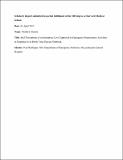| dc.description.abstract | Purpose: As hospitals continue to consolidate to improve efficiency and increase financial stability, leaders will have to determine the relative benefits and challenges of approaching emergency preparedness activities at the enterprise level versus the institution level. Investigating the perceptions of those most closely involved with enterprise-level emergency preparedness activities in response to events as they occur may provide an opportunity to determine if an enterprise-level approach is more beneficial than an institution-level approach, and, if so, which aspects of that approach are most helpful or burdensome.
Methods: Utilizing our enterprise’s central emergency management staff, we first established dedicated communications groups and new organizational structures among leaders from emergency management, infection control, laboratory services, waste management, occupational health, public affairs, and others across the enterprise that were dedicated to EVD planning. At the direction of the centralized enterprise planning group, discipline-specific subgroups were created to concentrate the expertise of staff across multiple sites and expedite the development of common clinical and operational guidelines. The centralized planning group also created a tiered system of care and concentrated several functions at the tertiary, academic medical centers within the system.
The survey consisted of multiple types of queries including multiple choice, Likert scale, ranking, and open-ended questions. A request to participate was e-mailed to 89 individuals who participated in the system’s activities. Responses were collected using SurveyMonkey software and data were entered into Microsoft Excel. Descriptive statistics were used to analyze the data. Continuous variables were summarized using mean with standard deviation (SD) while categorical variables were summarized using frequency analysis and percentages.
Results: 89% (17/19) of survey respondents agreed or strongly agreed that that the development of enterprise-wide, discipline-specific subgroups was an effective way to address complex problems, with. Respondents also highly agreed with the concept that they had better access to information (79%) and plans were developed faster with faster issue resolution (79%) because ofthe enterprise-wide approach to the response. Most respondents felt that the output of the response activities was worth the time and effort they put into them (79%), while only 11% felt enterprise-level activities were burdensome.
Conclusion: Respondents felt that, compared to an institution-level approach, an enterprise-level approach made communications more effective, information easier to access, and guidelines simpler to establish and implement with the identification of leaders and the formation of discipline-specific subgroups. They also reported that enterprise-level activities were a good use of their time, and few felt burdened by the efforts required. | |


